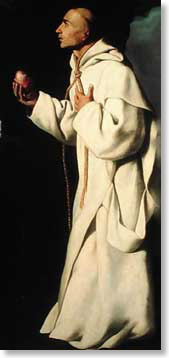Howton Grove Priory | Mobile WebsiteSharing a Vocation with the World . . .
The Carthusian Martyrs
04/May/2010 Filed in: Jottings

Do such martyrs have anything to teach us today when, rightly, we are all keen to put the polemics of a past age behind us? I think they do. We can honour brave men and women of faith in every generation and learn from their steadfastness. I may give offence to some of my Anglican friends (none is intended) when I say nothing becomes Cranmer so well as his death: he knew nothing could save him by that stage, but he went to the stake with a recantation in his pocket because he was not sure whether that was right. On 6 May we shall be going to the polls. How we use our vote matters. Probably none of the candidates will be "ideal" from our point of view. We shall have to compromise, but the compromise we make must be thoughtfully and carefully worked out. Much is at stake, if not quite as literally as in the case of many of our martyrs.
Dec 2010
Nov 2010
Oct 2010
Sep 2010
Aug 2010
Jul 2010
Jun 2010
May 2010
Apr 2010
Mar 2010
Feb 2010
Jan 2010
Dec 2009
Nov 2009
Oct 2009
Sep 2009
Aug 2009
Jul 2009
Jun 2009
May 2009
Apr 2009
Mar 2009
Feb 2009
Jan 2009
Dec 2008
Nov 2008
Oct 2008
Sep 2008
Aug 2008
Jul 2008
Jun 2008
May 2008
Apr 2008
Mar 2008
Feb 2008
Jan 2008
Dec 2007
Nov 2007
Oct 2007
Sep 2007
Aug 2007
Jul 2007
Jun 2007
Nov 2010
Oct 2010
Sep 2010
Aug 2010
Jul 2010
Jun 2010
May 2010
Apr 2010
Mar 2010
Feb 2010
Jan 2010
Dec 2009
Nov 2009
Oct 2009
Sep 2009
Aug 2009
Jul 2009
Jun 2009
May 2009
Apr 2009
Mar 2009
Feb 2009
Jan 2009
Dec 2008
Nov 2008
Oct 2008
Sep 2008
Aug 2008
Jul 2008
Jun 2008
May 2008
Apr 2008
Mar 2008
Feb 2008
Jan 2008
Dec 2007
Nov 2007
Oct 2007
Sep 2007
Aug 2007
Jul 2007
Jun 2007